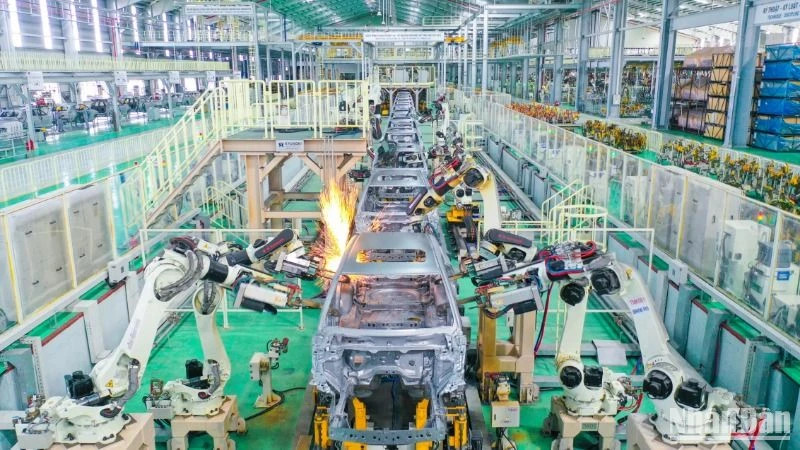The digital technology industry has been identified by the Central Party as a foundational industry to promote the digital transformation revolution.
In 2024, the total revenue of the digital technology industry is estimated to reach 152 billion USD, an increase of 35.7% compared to 2019. Vietnam's value in the total revenue of the digital technology industry reached 31.8%, up from 21.35% in 2019. The total number of employees reached 1.67 million people, an increase of 67% compared to 2019. The whole industry has 54,500 operating enterprises.
In 2023, Vietnam will have 5 digital technology industry products ranked among the top in the world — standing 2nd in the world in exporting smart mobile phones, 5th in the world in exporting computer components, 6th in the world in exporting computer equipment, 8th in the world in electronic components, and 7th in the world in software outsourcing.
To develop the digital technology industry, at the 8th Session of the 15th National Assembly, the government submitted the draft Law on Digital Technology Industry to the National Assembly to affirm the legal value of the digital technology industry and form regulations and policies to promote the development of the digital technology industry.
The Law on Digital Technology Industry supports the strong development of the digital technology industry to become an economic sector that contributes greatly to the country’s economy, creating the most favourable environment to nurture the development of digital technology enterprises, gradually shifting from assembly and processing to innovation, design, integration, production, and mastery of core technology in Vietnam, thus contributing to building a digital government as a driving force for the development of the digital economy and digital society.
The draft law clearly shows the necessary contents for the comprehensive development of the digital technology industry such as: research and development of digital technology, development of digital technology industry infrastructure, promotion of a comprehensive digital technology ecosystem, development of digital technology enterprises, digital technology products and services, technical standards and regulations, and development of digital technology human resources.
Regarding preferential policies for the digital technology industry, the law stipulates incentives for digital technology industry activities: Incentives for the digital technology industry are based on the principle of referring to current preferential regulations in the laws on investment, tax, credit, high technology, etc.
In addition, the draft law stipulates several key incentives for a number of special and specific projects in the field of digital technology industry, with a focus on key products, software, semiconductors, artificial intelligence, artificial intelligence data processing and storage centres, digital technology research and development centres, investment research, and support for digital technology transfer.
In parallel with the inclusion of regulations on incentive and support mechanisms in the draft Law on Digital Technology Industry, the drafting agency will continue to closely coordinate with the ministries that are in charge of amending the Law on Corporate Income Tax, the Investment Law, etc., to ensure the highest incentive policies, focus, and key points for projects of special nature and scale, not spread out for the digital technology industry to ensure synchronisation, unity, and avoid duplication in the legal system.
















